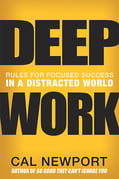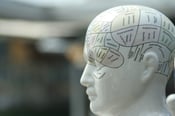 I just finished listening to a great podcast episode from Dr. Scott Barry Kaufman’s Psychology Podcast (one of my favorite podcasts because it’s generally, entertaining, informative and practical as it relates to helping you better understand the world around you) about the concept of Deep Work.
I just finished listening to a great podcast episode from Dr. Scott Barry Kaufman’s Psychology Podcast (one of my favorite podcasts because it’s generally, entertaining, informative and practical as it relates to helping you better understand the world around you) about the concept of Deep Work.
Improving Academic PerfORMANCE
Learn how to improve yourself through targeted learning and improved study skills.
Posts by Mark Skoskiewicz:
How 1% improvement can turn an F into an A
 Most students don’t realize how small, incremental improvements can accumulate over time to create significant jumps in skill level or academic performance.
Most students don’t realize how small, incremental improvements can accumulate over time to create significant jumps in skill level or academic performance.
Let’s begin by exploring some theories about performance and success that have a lot to do with becoming comfortable struggling and striving to make small improvements. Later, we’ll show how a seemingly small improvement of just 1% a week can turn an F into an A.
Making the Most of Summer
Mindfulness as a Vehicle for Improving Cognition & Reducing Stress
 There’s been a lot of talk recently (in certain psychology or educational circles, at least) on the topic of mindfulness practice and its various benefits. What was once a feature of eastern philosophy/religion has grown into an increasingly Western and somewhat mainstream activity. Two of the most potentially powerful benefits of mindfulness practice include cognitive enhancement and stress-reduction. As a result, mindfulness has started to be implemented in school systems and curricula worldwide. But what is the practice of mindfulness, just how effective is it, and how can we reap the benefits by incorporating mindfulness into our lives? .
There’s been a lot of talk recently (in certain psychology or educational circles, at least) on the topic of mindfulness practice and its various benefits. What was once a feature of eastern philosophy/religion has grown into an increasingly Western and somewhat mainstream activity. Two of the most potentially powerful benefits of mindfulness practice include cognitive enhancement and stress-reduction. As a result, mindfulness has started to be implemented in school systems and curricula worldwide. But what is the practice of mindfulness, just how effective is it, and how can we reap the benefits by incorporating mindfulness into our lives? .
“Mindfulness can be defined as the psychological capacity to stay willfully present with one's experiences, with a non-judgmental or accepting attitude, engendering a warm and friendly openness and curiosity” (Kabat-Zinn, 2005). This article explores the science behind mindfulness practice and its effects on academic performance and stress reduction along with a few helpful tips to incorporate mindfulness practice into your daily living.
Does Better Sleep Equal Better Grades?
Just as the energizer bunny must recharge his batteries every now and then, humans must also take time to power down, rest  and recharge for the following day. But just how important is it to get a full nights rest?
and recharge for the following day. But just how important is it to get a full nights rest?
Could getting the right amount of sleep (which for many people nowadays means more sleep) beneficially affect academic performance? Indeed, this is exactly what much of the data shows.
Are you studying effectively? (For your learning style?)
 We’ve all heard someone say: “I’m not doing well in this class because I am a visual learner and all the professor does is give boring lectures.”
We’ve all heard someone say: “I’m not doing well in this class because I am a visual learner and all the professor does is give boring lectures.”
What does this really mean?
There are four Learning Styles; visual, auditory, reading/writing and kinesthetic. Understanding which one/s you fall into can prove beneficial in the development of study and retention skills. Though we may feel we identify with one type of learning over another, the following are undoubtedly study tips that can help us all- not just in studying for exams but in actually retaining the material we’ve learned beyond them.
